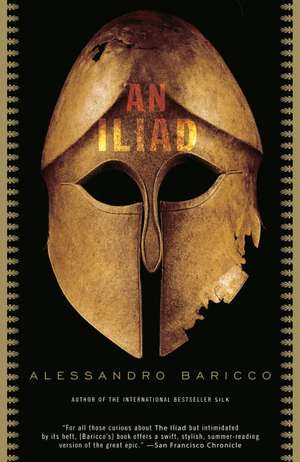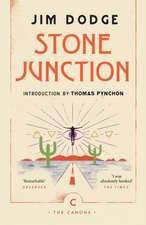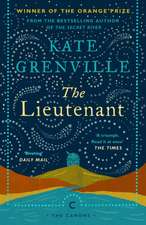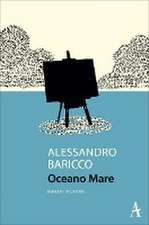An Iliad
Autor Alessandro Baricco Traducere de Ann Goldsteinen Limba Engleză Paperback – 31 iul 2007
In An Iliad, Alessandro Baricco re-creates the siege of Troy through the voices of twenty-one Homeric characters, in the narrative idiom of our modern imagination. From the return of Chryseis to the burial of Hector, we see through human eyes and feel with human hearts the unforgettable events first recounted almost three thousand years ago. Imbuing the stuff of legend with a startling new relevancy and humanity, Baricco gives us The Iliad as we have never known it. His transformative achievement is certain to delight and fascinate all readers of Homer’s indispensable classic.
Preț: 79.83 lei
Nou
Puncte Express: 120
Preț estimativ în valută:
15.28€ • 15.78$ • 12.71£
15.28€ • 15.78$ • 12.71£
Carte indisponibilă temporar
Doresc să fiu notificat când acest titlu va fi disponibil:
Se trimite...
Preluare comenzi: 021 569.72.76
Specificații
ISBN-13: 9780307275394
ISBN-10: 0307275396
Pagini: 158
Dimensiuni: 141 x 202 x 13 mm
Greutate: 0.19 kg
Editura: Vintage Books USA
ISBN-10: 0307275396
Pagini: 158
Dimensiuni: 141 x 202 x 13 mm
Greutate: 0.19 kg
Editura: Vintage Books USA
Notă biografică
Alessandro Baricco was born in Turin in 1958 and still makes his home there. The author of four previous novels, he has won the Prix Médicis Étranger in France and the Selezione Campiello, Viareggio, and Palazzo al Bosco prizes in Italy.
Extras
Chryseis
It all began on a day of violence.
For nine years the Achaeans had besieged Troy: often they needed provisions or animals or women, and then they abandoned the siege and went to get what they wanted by plundering the nearby cities. That day it was the turn of Thebes, my city. They seized what they wanted and brought it to their ships.
I was among the women they carried off. I was a beauty: when, in their camp, the Achaean chieftains divided up the spoils, Agamemnon saw me and wanted me for himself. He was the king of kings, and the commander of all the Achaeans: he brought me to his tent, and to his bed. He had a wife, at home, called Clytemnestra. He loved her. But that day he saw me and wanted me for himself.
Some days afterward my father came to the camp. His name was Chryses, and he was a priest of Apollo. He was an old man. He brought splendid gifts and asked the Achaeans, in exchange, to set me free. As I said: he was an old man and a priest of Apollo. All the Achaean chiefs, after seeing and listening to him, were in favor of accepting the ransom and honoring the noble figure who had come to them as a suppliant. Only one among them was not won over: Agamemnon. He rose and railed brutally against my father, saying to him, "Go away, old man, and don't show yourself again. I will not give up your daughter: she will grow old in Argos, in my house, far from her homeland, working at the loom and sharing my bed. Go now, if you want to go with your life."
My father, frightened, obeyed. He went away in silence and disappeared along the shore of the sea—you might have said into the sound of the sea. Then, suddenly, death and suffering fell upon the Achaeans. For nine days, arrows flew, killing men and beasts, and the pyres of the dead blazed without respite. On the tenth day, Achilles summoned the army to a meeting. In front of all the men he said, "If things continue like this, we'll have to launch our ships and go home in order to escape death. But let's consult a prophet, or a seer, or a priest who can tell us what is happening and free us from this scourge."
Then Calchas rose, the most famous among the seers. He knew all the things that have been, are, and will be. He was a wise man. He said, "You want to know the reason for this, Achilles, and I will tell you. But swear that you will protect me, because what I'm going to say will offend a man who has power over all the Achaeans and whom all the Achaeans obey. I'm risking my life: swear that you will protect me."
Achilles told him not to be afraid, but to say what he knew. He said, "As long as I live, no one among the Achaeans will dare raise a hand against you. No one. Not even Agamemnon."
Then the seer took courage and said, "When we offended that old man, suffering came upon us. Agamemnon refused the ransom and would not give up the daughter of Chryses: and suffering came upon us. There is only one way to rid ourselves of it: restore to Chryses that girl with the sparkling eyes, before it's too late." Thus he spoke, and he sat down.
Agamemnon rose, his heart brimming with black fury and his eyes flashing fire. He looked at Calchas with hatred and said, "Prophet of doom, you have never given me a favorable prophecy. You like to reveal only evil, never good. And now you want to deprive me of Chryseis, whom I desire more than my own wife, Clytemnestra, and who rivals her in beauty, intelligence, and nobility of spirit. Must I give her up? I will do so, because I want the army to be saved. I will do it, if so it must be. But find me a prize to replace her immediately, because it is not right that I alone, among the Achaeans, should remain without honor. I want another prize for myself."
Then Achilles said, "How can we find you a prize, Agamemnon? The spoils have already been divided, and it wouldn't be fitting to start over again from the beginning. Give back the girl and we'll repay you three, four times over when we capture Ilium."
Agamemnon shook his head. "You don't deceive me, Achilles. You want to keep your prize and leave me with nothing. No, I will give back that girl and then I'll come and take what I like, and maybe I'll take something from Ajax, or Odysseus, or maybe I'll take something from you."
Achilles looked at him with hatred. "You insolent, greedy man," he said. "And you expect the Achaeans to follow you into battle? I didn't come here to fight the Trojans—they haven't done anything to me. They haven't stolen oxen or horses from me, or destroyed my harvest: my land is divided from theirs by shadowy mountains and a roaring sea. I'm here because I followed you, arrogant man, to defend Menelaus's honor and yours. And you, you bastard, dog face, you couldn't care less, and threaten to take away the prize I fought for? No, it's better that I return home rather than stay to be dishonored, fighting to win treasures and riches for you."
Then Agamemnon answered, "Go if you want, I won't beg you to stay. Others will gain honor at my side. I don't like you, Achilles: you love quarrel, strife, war. You're strong, it's true, but that's a gift. Leave, go home and rule in your own house. You are nothing to me, and I'm not afraid of your anger. Let me tell you this: I will send Chryseis back to her father, on my ship, with my men. But then I'll come to your tent and take for myself the beautiful Briseis, your prize, so that you'll know who is the stronger, and all men will learn to fear me."
Thus he spoke. And it was as if he had struck Achilles a blow to the heart. And the son of Peleus was about to unsheathe his sword and certainly would have killed Agamemnon if at the last minute he had not mastered his fury and stopped his hand on the silver hilt. He looked at Agamemnon and in a rage said:
"You with the face of a dog, the heart of a deer—you coward. I swear on this scepter that the day will come when the Achaeans, all of them, will long for me. When they are dropping under Hector's assaults, they will long for me. And you will suffer for them, but will be able to do nothing. You will only remember the day you insulted the best of the Achaeans, and go mad with rage and remorse. That day will come, Agamemnon. I swear it."
Thus he spoke, and hurled the gold-studded scepter to the ground.
When the assembly broke up, Agamemnon ordered one of his ships brought down to the sea, assigned to it twenty men, and put in charge Odysseus, the wily one. Then he came to me, took me by the hand, and led me to the ship. "Beautiful Chryseis," he said. And he let me return to my father and my homeland. He stood there, on the shore, watching the ship set sail.
When he saw it disappear over the horizon he called two men among his loyal followers and ordered them to go to the tent of Achilles, to take Briseis by the hand and lead her away. He said to them, "If Achilles refuses to give her up, then tell him that I will come and get her, and it will be much worse for him." The two soldiers were called Talthybios and Eurybates. They set off reluctantly along the shore of the sea and finally reached the camp of the Myrmidons. They found Achilles sitting beside his tent and his black ship. They stood before him and said nothing, because they were frightened and in awe of the king. So it was he who spoke.
"Come," he said. "You're not at fault in all this—Agamemnon is. Don't be afraid." Then he called Patroclus and told him to fetch Briseis and hand her over to the two soldiers, so that they could lead her away. "You are my witnesses," he said, looking at them. "Agamemnon is foolish. He doesn't think about what will happen, he doesn't think about when he might need me to defend the Achaeans and their ships. To him nothing matters in the past or the future. You are my witnesses, that man is a fool."
The men set off, retracing their path beside the swift ships of the Achaeans, drawn up on the beach. Behind them walked beautiful Briseis. Sadly she went—and reluctant.
Achilles watched them go. And then he went and sat alone on the shore of the white-foaming sea, and burst into tears, with the infinite ocean before him. He was the lord of the war and the terror of every Trojan. But he burst into tears and like a child began calling his mother. From far away she came, then, and appeared to him. She sat beside him and stroked him gently. Softly, she called him by name. "My son, why did I bring you into the world, I, your unhappy mother? Your life will be short enough. If only you could spend it without tears and without sorrow."
Achilles asked, "Can you save me, Mother? Can you do it?"
But his mother said only, "Listen to me: stay here, near the ships, and don't go into battle. Hold on to your anger against the Achaeans and don't yield to your desire for war. I tell you: one day they will offer you shining gifts, and they'll give you three times as many, for the insult you received." Then she disappeared, and Achilles sat there, alone. His soul was filled with rage for the injustice he had suffered, and his heart was consumed by yearning for the cry of battle and the tumult of war.
I saw my city again when the ship, commanded by Odysseus, entered the harbor. The sails were lowered, the ship approached the mooring under oars. The crew threw the anchors over and tied the stern ropes. First they unloaded the animals for sacrifice to Apollo. Then Odysseus took me by the hand and led me to land. He guided me to the altar of Apollo, where my father was waiting for me. He let me go, and my father took me in his arms, overcome with joy.
Odysseus and his men spent the night beside their ship. At dawn they raised the sails to the wind and departed. I saw the ship speed lightly as the waves foamed around the prow. I saw it disappear over the horizon. Can you imagine what my life was then? Every so often I dream of dust, weapons, riches, and young heroes. It is always the same place, on the shore of the sea. There is the smell of blood and of men. I live there, and the king of kings throws to the winds his life and his people, for me: for my beauty and my charms. When I wake there is my father at my side. He caresses me and says, It's over, my daughter. It's all over.
Thersites
They all knew me. I was the ugliest man who went to the siege of Troy: bowlegged, lame, shoulders humped and curving in over my chest; a pointed head covered by a scraggly fuzz. I was famous because I liked to insult the kings, all the kings: the Achaeans listened to me and laughed. And so the kings of the Achaeans hated me. I want to tell you what I know, so that you, too, will understand what I understood: war is an obsession of old men, who send the young to fight.
Agamemnon was in his tent and he was sleeping. Suddenly he seemed to hear the voice of Nestor, who was the oldest of us all, our most beloved and respected sage. The voice said, "Agamemnon, son of Atreus, here you are sleeping, you who command an entire army and should have so many things to do." Agamemnon didn't open his eyes. He thought he was dreaming. Then the voice drew closer and said, "Listen to me, I have a message for you from Zeus, who is watching you from far away, and feels sorrow and pity for you. He orders you to arm the Achaeans at once, because today you will be able to take Troy by force. The gods, all of them, will be on your side, and your enemies will be doomed. Don't forget this when sweet sleep abandons you, and you wake. Don't forget this message from Zeus."
Then the voice vanished. Agamemnon opened his eyes. He didn't see the old man Nestor, who slipped silently out of the tent. He thought he had been dreaming, and that in his dream he had seen himself the victor. Then he rose and put on a new tunic, beautiful and soft, and over it a sweeping cloak. He put on his best sandals, and over his shoulder slung the silver-studded sword. Finally he seized the scepter of his fathers and, holding it tight in his fist, set out for the ships of the Achaeans, while Aurora announced the light of day to Zeus and all the immortals. He ordered the heralds, with their clear voices, to call the Achaeans to an assembly, and when they had all gathered he summoned first the noble princes of the council. He told them his dream. Then he said, "Today we'll arm the Achaeans and attack. But first I want to test the army, as is my right. I'll tell the soldiers that I have decided to give up the war and return home. You will try to persuade them to stay and continue the fight. I want to see what happens."
The noble princes were silent, uncertain what to think. Then Nestor the old man rose, Nestor himself, and he said, "Friends, leaders and rulers of the Achaeans, if any one of us should recount such a dream, we wouldn't listen to that man, thinking that he was lying. But he who dreamed it claims to be the best among the Achaeans. Therefore I say: let us go and arm our men." Then he rose and left the council. The others saw him going, and, as if following their shepherd, they all rose, in turn, and went to assemble their men.
From the Hardcover edition.
It all began on a day of violence.
For nine years the Achaeans had besieged Troy: often they needed provisions or animals or women, and then they abandoned the siege and went to get what they wanted by plundering the nearby cities. That day it was the turn of Thebes, my city. They seized what they wanted and brought it to their ships.
I was among the women they carried off. I was a beauty: when, in their camp, the Achaean chieftains divided up the spoils, Agamemnon saw me and wanted me for himself. He was the king of kings, and the commander of all the Achaeans: he brought me to his tent, and to his bed. He had a wife, at home, called Clytemnestra. He loved her. But that day he saw me and wanted me for himself.
Some days afterward my father came to the camp. His name was Chryses, and he was a priest of Apollo. He was an old man. He brought splendid gifts and asked the Achaeans, in exchange, to set me free. As I said: he was an old man and a priest of Apollo. All the Achaean chiefs, after seeing and listening to him, were in favor of accepting the ransom and honoring the noble figure who had come to them as a suppliant. Only one among them was not won over: Agamemnon. He rose and railed brutally against my father, saying to him, "Go away, old man, and don't show yourself again. I will not give up your daughter: she will grow old in Argos, in my house, far from her homeland, working at the loom and sharing my bed. Go now, if you want to go with your life."
My father, frightened, obeyed. He went away in silence and disappeared along the shore of the sea—you might have said into the sound of the sea. Then, suddenly, death and suffering fell upon the Achaeans. For nine days, arrows flew, killing men and beasts, and the pyres of the dead blazed without respite. On the tenth day, Achilles summoned the army to a meeting. In front of all the men he said, "If things continue like this, we'll have to launch our ships and go home in order to escape death. But let's consult a prophet, or a seer, or a priest who can tell us what is happening and free us from this scourge."
Then Calchas rose, the most famous among the seers. He knew all the things that have been, are, and will be. He was a wise man. He said, "You want to know the reason for this, Achilles, and I will tell you. But swear that you will protect me, because what I'm going to say will offend a man who has power over all the Achaeans and whom all the Achaeans obey. I'm risking my life: swear that you will protect me."
Achilles told him not to be afraid, but to say what he knew. He said, "As long as I live, no one among the Achaeans will dare raise a hand against you. No one. Not even Agamemnon."
Then the seer took courage and said, "When we offended that old man, suffering came upon us. Agamemnon refused the ransom and would not give up the daughter of Chryses: and suffering came upon us. There is only one way to rid ourselves of it: restore to Chryses that girl with the sparkling eyes, before it's too late." Thus he spoke, and he sat down.
Agamemnon rose, his heart brimming with black fury and his eyes flashing fire. He looked at Calchas with hatred and said, "Prophet of doom, you have never given me a favorable prophecy. You like to reveal only evil, never good. And now you want to deprive me of Chryseis, whom I desire more than my own wife, Clytemnestra, and who rivals her in beauty, intelligence, and nobility of spirit. Must I give her up? I will do so, because I want the army to be saved. I will do it, if so it must be. But find me a prize to replace her immediately, because it is not right that I alone, among the Achaeans, should remain without honor. I want another prize for myself."
Then Achilles said, "How can we find you a prize, Agamemnon? The spoils have already been divided, and it wouldn't be fitting to start over again from the beginning. Give back the girl and we'll repay you three, four times over when we capture Ilium."
Agamemnon shook his head. "You don't deceive me, Achilles. You want to keep your prize and leave me with nothing. No, I will give back that girl and then I'll come and take what I like, and maybe I'll take something from Ajax, or Odysseus, or maybe I'll take something from you."
Achilles looked at him with hatred. "You insolent, greedy man," he said. "And you expect the Achaeans to follow you into battle? I didn't come here to fight the Trojans—they haven't done anything to me. They haven't stolen oxen or horses from me, or destroyed my harvest: my land is divided from theirs by shadowy mountains and a roaring sea. I'm here because I followed you, arrogant man, to defend Menelaus's honor and yours. And you, you bastard, dog face, you couldn't care less, and threaten to take away the prize I fought for? No, it's better that I return home rather than stay to be dishonored, fighting to win treasures and riches for you."
Then Agamemnon answered, "Go if you want, I won't beg you to stay. Others will gain honor at my side. I don't like you, Achilles: you love quarrel, strife, war. You're strong, it's true, but that's a gift. Leave, go home and rule in your own house. You are nothing to me, and I'm not afraid of your anger. Let me tell you this: I will send Chryseis back to her father, on my ship, with my men. But then I'll come to your tent and take for myself the beautiful Briseis, your prize, so that you'll know who is the stronger, and all men will learn to fear me."
Thus he spoke. And it was as if he had struck Achilles a blow to the heart. And the son of Peleus was about to unsheathe his sword and certainly would have killed Agamemnon if at the last minute he had not mastered his fury and stopped his hand on the silver hilt. He looked at Agamemnon and in a rage said:
"You with the face of a dog, the heart of a deer—you coward. I swear on this scepter that the day will come when the Achaeans, all of them, will long for me. When they are dropping under Hector's assaults, they will long for me. And you will suffer for them, but will be able to do nothing. You will only remember the day you insulted the best of the Achaeans, and go mad with rage and remorse. That day will come, Agamemnon. I swear it."
Thus he spoke, and hurled the gold-studded scepter to the ground.
When the assembly broke up, Agamemnon ordered one of his ships brought down to the sea, assigned to it twenty men, and put in charge Odysseus, the wily one. Then he came to me, took me by the hand, and led me to the ship. "Beautiful Chryseis," he said. And he let me return to my father and my homeland. He stood there, on the shore, watching the ship set sail.
When he saw it disappear over the horizon he called two men among his loyal followers and ordered them to go to the tent of Achilles, to take Briseis by the hand and lead her away. He said to them, "If Achilles refuses to give her up, then tell him that I will come and get her, and it will be much worse for him." The two soldiers were called Talthybios and Eurybates. They set off reluctantly along the shore of the sea and finally reached the camp of the Myrmidons. They found Achilles sitting beside his tent and his black ship. They stood before him and said nothing, because they were frightened and in awe of the king. So it was he who spoke.
"Come," he said. "You're not at fault in all this—Agamemnon is. Don't be afraid." Then he called Patroclus and told him to fetch Briseis and hand her over to the two soldiers, so that they could lead her away. "You are my witnesses," he said, looking at them. "Agamemnon is foolish. He doesn't think about what will happen, he doesn't think about when he might need me to defend the Achaeans and their ships. To him nothing matters in the past or the future. You are my witnesses, that man is a fool."
The men set off, retracing their path beside the swift ships of the Achaeans, drawn up on the beach. Behind them walked beautiful Briseis. Sadly she went—and reluctant.
Achilles watched them go. And then he went and sat alone on the shore of the white-foaming sea, and burst into tears, with the infinite ocean before him. He was the lord of the war and the terror of every Trojan. But he burst into tears and like a child began calling his mother. From far away she came, then, and appeared to him. She sat beside him and stroked him gently. Softly, she called him by name. "My son, why did I bring you into the world, I, your unhappy mother? Your life will be short enough. If only you could spend it without tears and without sorrow."
Achilles asked, "Can you save me, Mother? Can you do it?"
But his mother said only, "Listen to me: stay here, near the ships, and don't go into battle. Hold on to your anger against the Achaeans and don't yield to your desire for war. I tell you: one day they will offer you shining gifts, and they'll give you three times as many, for the insult you received." Then she disappeared, and Achilles sat there, alone. His soul was filled with rage for the injustice he had suffered, and his heart was consumed by yearning for the cry of battle and the tumult of war.
I saw my city again when the ship, commanded by Odysseus, entered the harbor. The sails were lowered, the ship approached the mooring under oars. The crew threw the anchors over and tied the stern ropes. First they unloaded the animals for sacrifice to Apollo. Then Odysseus took me by the hand and led me to land. He guided me to the altar of Apollo, where my father was waiting for me. He let me go, and my father took me in his arms, overcome with joy.
Odysseus and his men spent the night beside their ship. At dawn they raised the sails to the wind and departed. I saw the ship speed lightly as the waves foamed around the prow. I saw it disappear over the horizon. Can you imagine what my life was then? Every so often I dream of dust, weapons, riches, and young heroes. It is always the same place, on the shore of the sea. There is the smell of blood and of men. I live there, and the king of kings throws to the winds his life and his people, for me: for my beauty and my charms. When I wake there is my father at my side. He caresses me and says, It's over, my daughter. It's all over.
Thersites
They all knew me. I was the ugliest man who went to the siege of Troy: bowlegged, lame, shoulders humped and curving in over my chest; a pointed head covered by a scraggly fuzz. I was famous because I liked to insult the kings, all the kings: the Achaeans listened to me and laughed. And so the kings of the Achaeans hated me. I want to tell you what I know, so that you, too, will understand what I understood: war is an obsession of old men, who send the young to fight.
Agamemnon was in his tent and he was sleeping. Suddenly he seemed to hear the voice of Nestor, who was the oldest of us all, our most beloved and respected sage. The voice said, "Agamemnon, son of Atreus, here you are sleeping, you who command an entire army and should have so many things to do." Agamemnon didn't open his eyes. He thought he was dreaming. Then the voice drew closer and said, "Listen to me, I have a message for you from Zeus, who is watching you from far away, and feels sorrow and pity for you. He orders you to arm the Achaeans at once, because today you will be able to take Troy by force. The gods, all of them, will be on your side, and your enemies will be doomed. Don't forget this when sweet sleep abandons you, and you wake. Don't forget this message from Zeus."
Then the voice vanished. Agamemnon opened his eyes. He didn't see the old man Nestor, who slipped silently out of the tent. He thought he had been dreaming, and that in his dream he had seen himself the victor. Then he rose and put on a new tunic, beautiful and soft, and over it a sweeping cloak. He put on his best sandals, and over his shoulder slung the silver-studded sword. Finally he seized the scepter of his fathers and, holding it tight in his fist, set out for the ships of the Achaeans, while Aurora announced the light of day to Zeus and all the immortals. He ordered the heralds, with their clear voices, to call the Achaeans to an assembly, and when they had all gathered he summoned first the noble princes of the council. He told them his dream. Then he said, "Today we'll arm the Achaeans and attack. But first I want to test the army, as is my right. I'll tell the soldiers that I have decided to give up the war and return home. You will try to persuade them to stay and continue the fight. I want to see what happens."
The noble princes were silent, uncertain what to think. Then Nestor the old man rose, Nestor himself, and he said, "Friends, leaders and rulers of the Achaeans, if any one of us should recount such a dream, we wouldn't listen to that man, thinking that he was lying. But he who dreamed it claims to be the best among the Achaeans. Therefore I say: let us go and arm our men." Then he rose and left the council. The others saw him going, and, as if following their shepherd, they all rose, in turn, and went to assemble their men.
From the Hardcover edition.
Recenzii
“For all those curious about The Iliad but intimidated by its heft, Baricco’s book offers a swift, stylish, summer-reading version of the great epic.”
—San Francisco Chronicle
“A taut and mesmerizing tale.”
—The Seattle Times
“Baricco divides the tale into a series of monologues by characters both major and minor. The result is compelling, occasionally thrilling.” —Entertainment Weekly
—San Francisco Chronicle
“A taut and mesmerizing tale.”
—The Seattle Times
“Baricco divides the tale into a series of monologues by characters both major and minor. The result is compelling, occasionally thrilling.” —Entertainment Weekly
Descriere
The acclaimed author of the bestseller "Silk" now offers a bold reimagining of our civilization's greatest tale of war: the siege of Troy, as told through the voices of 21 Homeric characters in the narrative idiom of our modern imagination.











